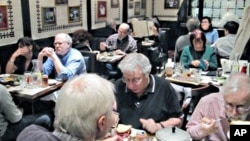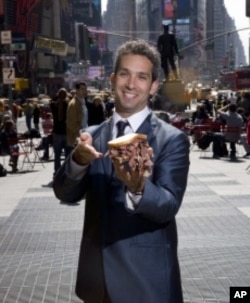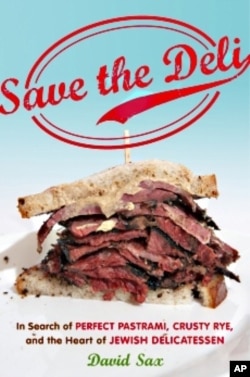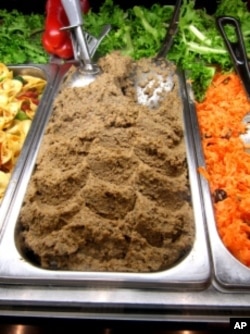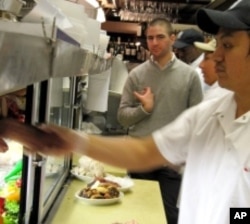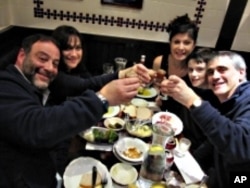It's 6 p.m., and the dinner crowd is filling up the pleasantly cramped dining room of the 2nd Avenue Deli in Midtown Manhattan.
That’s where self-styled “delicatatologist,” David Sax, chomps down on a huge homemade pickle, leans back in the sort of rickety wooden chair that is “deli de rigeur” and breathes in the atmosphere.
“You know you are in a deli when you walk in and you suddenly feel this warm embrace, like you’ve walked into the largest kitchen of some relative you’ve never met,” he says.
A vanishing breed
But the deli family is shrinking.
Less than a century ago, there were about 4,000 Jewish delicatessen restaurants in New York, all serving the smoked and pickled meats and “shmears” of chopped chicken liver beloved by Eastern European Jewish immigrants.
And while traditional delis continue to operate in the Big Apple, their numbers have declined to a few dozen or so.
Facing more competition, traditional delicatessens are also getting more expensive to operate, making them a vanishing breed.
Several factors are at play. Cost is a major consideration for delis that serve kosher meat, which requires strict rabbinical supervision, and is more expensive than non-kosher meats.
Also, in a city with an endless choice of good ethnic eateries, delis are no longer the everyday destinations they once were.
Author David Sax, author of “Save the Deli,” surveys the merry scene at the 2nd Avenue Deli. Its chaotic energy is reminiscent of a family holiday dinner. “People are just running around and kind of shouting at you,‘What do you want?’,‘What do you need?’,‘Come on in’,‘Have a bite’ And in that craziness, that madness, there is just love, sheer love.”
Family atmosphere
Indeed, Lynn, a longtime waitress, says many of her customers see her more as a grandmother figure than a food server.
”They’re walking back in time and they want comfort and care, and I love being that for these people.” Lynn says she’s happy if her customers leave happy, even when they leave a crummy tip.
Lynn places a platter of blintzes and a bowl of steaming chicken soup at a table where 10-year-old Jonas Plaut, his parents and some family friends are sharing a meal.
”I like this restaurant because it’s like my family – food, laughter, fun, noise and lots of other stuff,” Jonas says between bites.
His father, Jeremy Plaut, enjoys the Yiddish words for the foods delis serve, “Kreplach,” he says, savoring the harsh consonant at the end of the word for dumplings.
He then takes a forkful of “gribenes,” an Old World specialty made of chicken skin and onions fried in “schmaltz” – chicken fat.
Sign of abundance
But whatever food one orders at a New York deli, portions are expected to be big. In his book, Sax explains that that tradition dates to the late 19th century, when Eastern European Jewish immigrants associated America with an abundance they never knew back home.
“These people were ‘the tired, the hungry,’ the Statue of Liberty was calling for. And the idea you would have a meal like we have here, with giant piles of gefilte fish and chopped liver, and to be able to just order a pound of corned beef on a whim. The people went nuts.”
But New York delis are a popular destination for non-Jews as well.
Sax interviewed dozens of African Americans, Arabs, Chinese and people from other lands who have either visited or worked in delis. “And they carry that passion [for delis] wherever they go,” he says.
'Save the Deli'
That passion is certainly shared by loyal employees like Dave.
He stands behind the deli’s gleaming glass counter six days a week, slicing the restaurant’s steaming meats like corned beef and pastrami while offering sample tastes to customers waiting for a table. “If [at first they order] a quarter pound, after I give them a taste, bingo, they make it a pound.”
Dave started working at the 2nd Avenue Delicatessen in 1976, when he was 17 years old. “I am still working with the same items. Deli is deli. Chopped liver is chopped liver. It never changes. It just gets better.”
“It’s definitely a labor of love,” says 2nd Avenue Deli owner Jeremy Liebewohl. “As a businessman, I am always striving to make my business as profitable as possible and successful as possible. But if you don’t love it, there is no way to make it work.”
Survival with pleasure is definitely the theme at a nearby table, where young Jonas' family hoists glasses overflowing with deli-style chocolate soda to make the traditional Jewish toast to life.
“L’chaim,” they say, infusing the deli itself with continued life.




